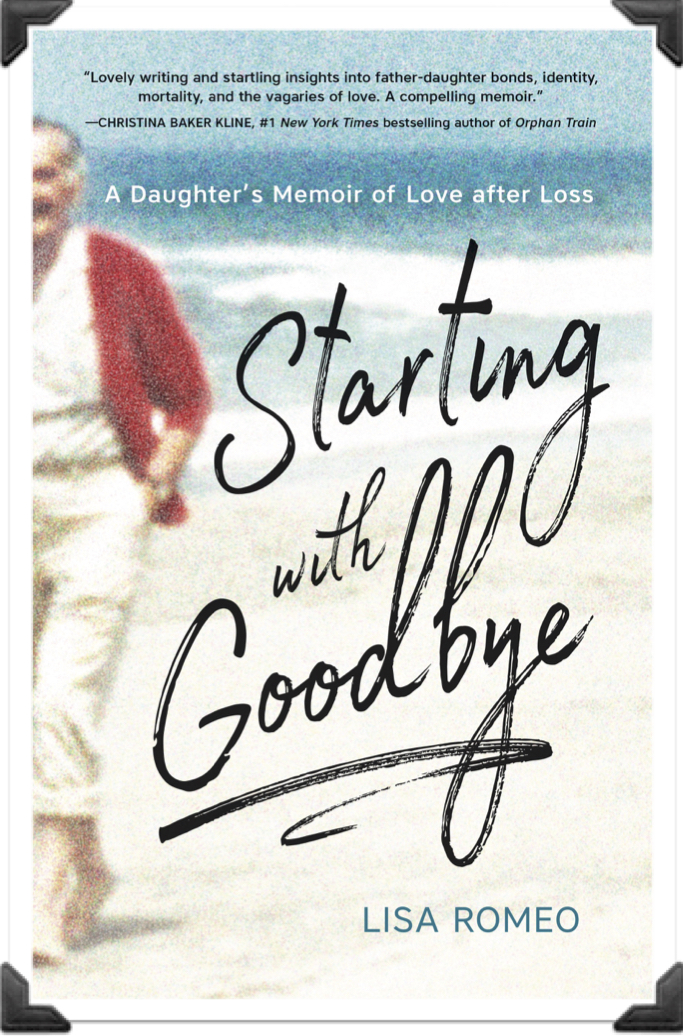Q&A with Author Lisa Romeo
Author of Starting with Goodbye
What inspired you to become a writer?
Reading, stories, and letters. My sister, who is 12 years older, taught me to read and write, and gave me my first typewriter when I was five-years-old, just as she left for college. I wrote her letters every week, and began to write silly stories, usually about horses.
My father told me made-up stories at bedtime and read two newspapers daily. Mom loved to read magazines and write letters. I’d set my typewriter on the dining room table next to her as she wrote letters, my father reading on the couch a few feet away, often reading out sections of newspaper articles—and then, when I was old enough, handing me the paper and saying, “Read this!”
Once in school, the Scholastic catalogs came around every two weeks, and I ordered books like mad. I also remember loving the feel of any printed object in my hands. A trip to the tiny local library was thrilling. I always checked out far more books than the librarians thought I could read in two weeks. (They were wrong.)
Maybe I also began to write because in a loud family with two older siblings, no one listened when I talked!
Why was it important for you to get this story on paper?
I wanted to tell this story because so many people told me about this sense of continuing a relationship with a deceased, dearly loved person, and how they’d been made to feel odd about it. It’s not odd, but Americans don’t like to talk of death beyond usual tropes about grief stages. We should talk about what happens, how grief is variable, why it’s natural and perhaps even helpful to still be “in conversation” with those who are gone—but who still feel very present to us.
What are some of the lessons that you learned while writing this book?
That the “truth” of our emotional experiences is essentially unknowable. That a story you once thought you knew everything about changes as you explore it. That people whose behavior you thought you understood deserve a closer look.
How did this book change you?
Because it took so long to write and publish, I’ve grown more patient. I used to think, “Hey I’m getting older, better hurry up.” Now, I see slowing down is often wiser. By writing about my father, I’m now more aware of parents’ influence on children—making me more curious about my role as mother to two now-adult sons. And I’m more cognizant of how family patterns develop and repeat and what we can learn from that.
What is the effect you hope this book has on people?
I hope that people facing a significant loss will be buoyed by the idea that it’s not too late to examine those relationships, learn from them, let them nourish us as we move on. That it’s okay—that it’s a good thing—to talk about departed loved ones, to talk to them, to keep them in our lives, and to see what we might discover about them, about ourselves.
If you had to change anything about what happened, what would it be?
Sometimes I wish I had traveled to see my parents more often when Dad was deteriorating and none of us wanted to face it, but I think that’s standard hindsight. I’m not an “if only” thinker. Onward!
What word would you use to describe the book?
Insistent.
What is your favorite memory with your father?
I have a lovely memory of the two of us walking around the Munich Zoo when I was nine, holding his hand, talking about animals, and sharing ice cream. I remember he never let go of my hand. In Starting with Goodbye, I write about his hands. I loved those hands.
Other good memories are of watching him helping someone else. I was always so proud of how he tried to improve others’ lot. And great memories of him laughing at himself when he did something silly, like fumbling with technology. He had a good sense of humor about himself.
Did this book help with the grieving process/or how did writing this book change and/or effect the grieving process?
I certainly didn’t write it to find “closure” (whatever that is). Writing the book felt organic, because writing is how I understand what’s happening inside me in response to outside events. Was it part of my grief process? I suppose. But then I don’t believe grief ends. It certainly changes, substantially. I’m still grieving; always will be.
If someone was going to follow in your footsteps, what advice would you give them?
If you mean writing memoir, my advice is to begin by writing in small chunks because that honors the way memory works—erratic and flitting about, not sequentially—to record what you can when you can. Then put it away, spend time thinking, then circle back and revise with an eye to putting it together in a way that makes narrative sense.
If you mean, grieving an important loved one with whom the relationship wasn’t ideal, I’d say: be kind to yourself. Guilt serves no one, but exploring what drove the relationship, why things may have happened as they did, could be surprisingly healing. And it’s okay to talk to your dead loved one—and to listen.


